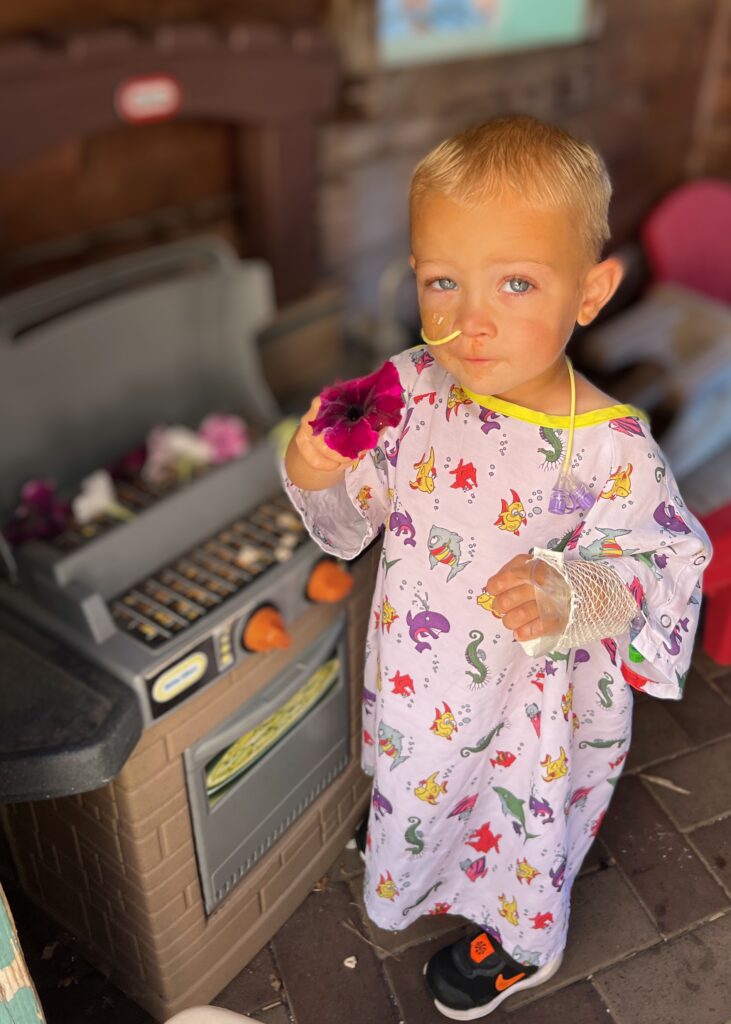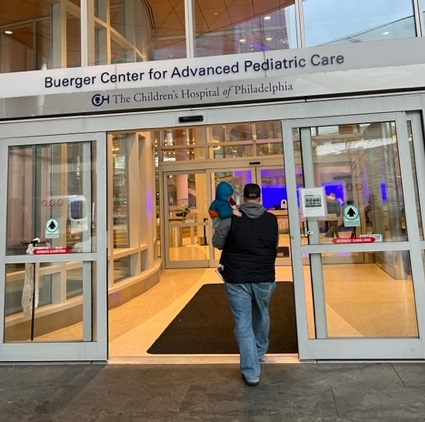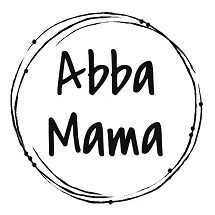Hearing the news
September 1, 2021, my phone rang and on the caller ID it read Doctor. I answered it and it was Dr Sam. I knew it couldn’t be good if the doctor was on the other line instead of his nurse. The first words he said was “have you left town yet?” “Briggs’ CT scan came back with abnormalities, and I am admitting him for further testing!”
After this call I felt numb, we were admitted, they began all the tests. It wasn’t until the next day when the results were in; the neurologist came in and explained to us what she thought Briggs had. She said, “it looks like one of two Leukodystrophies” What in the world is leukodystrophy? I knew with my medical education “leuko” was something white. She proceeded to explain it is a rare, genetic disorder that affects the white matter of the brain. She wanted to expedite her referral to the Mayo clinic for confirmation. When the word expedite came out of her mouth, I knew it had to be serious.
Coping with the fact that your son has a fatal genetic disorder, there is no cure, and all the other explanations don’t matter in that moment. When you receive a diagnosis, language is so important, the words and phrases that stuck with me in that room had some negative effects. In my mind I heard “go home and make memories”, “you don’t know what ones will be your last”, “any year without a seizure is a good year”, and “try to get into the clinical study”. That’s not exactly how it all went down but it’s how it was received. I don’t envy the doctors that have to give news like this to other families. I’m sure it’s just as hard on them as it is on us. Having HOPE is so seemly important, our support system letting us know “we will get thru this together”, “you’re not alone”, and “we are here to support you”. When you’re a parent you have to adjust, you don’t have a choice. This is your new normal and you’re going to roll with the punches!

After Math
It felt like there was a dark cloud over our heads, we couldn’t eat or sleep, trying to grasp the news and understand it. We were told not to google this, because everything you read on the internet isn’t always true. I know we’re not the first people doctors have told this to. Why do they say this when the diagnosis is bad? In my mind, I’m jumping on my phone as your talking because you told me NOT to Google it.
For me personally, the first 6 months I was living in a blur. I just had Arlee 5 weeks prior, and I was trying to adjust to having a newborn and Matt and I were trying to work thru our own emotions. It was hard finding a way to support each other, when we process things very differently. Explaining Briggs diagnosis to loved ones was hard, I felt everyone was in some sort of denial. I’m a realist, I need to know the what ifs so I can be prepared to deal with it. Matt is the opposite, he doesn’t want to know the what ifs, he just wants to live day by day. I remember we had to comfort others first before we got the support we needed. Letting them know its ok to ask questions, don’t push us away now that we have a medical complex child. Becoming a proactive parent, learning all we can to help our child live a normal life.
Finding our support system
As we left Mayo, Matt and I did not like what we gathered from this appointment. So, if we can’t get into the clinical study or it’s not for us what do we do next? I’m sure there were other people out there like us trying to process all this information. This is when I started digging deep, I searched Facebook for any and all leukodystrophies, as I was added to the groups and this is when I started to read all the comments, asking questions, and take notes. I felt like I was in collage again trying to learn as much information as I possibly can. Writing down all the different medications others are on and maybe one of these would help Briggs. I felt like I was reading an encyclopedia of medical knowledge. This is when I came across Dr Waldman out in Philidelphia at Childrens Hospital Of Philidelphia (CHOP). I reached out to her team, and I was patiently waiting for a call back. Finally in October we got a call they had reviewed all his medical records, and it was time set up all his appointments. We flew out to Philadelphia December 23rd. Matt and I met with her whole team, and when I say whole team its neuro, peds, speech, PT, Genetics, OT, and GI. We left all these appointments feeling overwhelmed, refreshed and having a better understanding on how Alexanders happens in the DNA making and things to look out for. I’m ready to be an advocate for Briggs. I started sharing my information; I had others reach out letting me know I’m not alone and sharing their stories. TOGETHER WE CAN CONCOR ANYTHING!

Impacting Diagnosis
After we got the diagnosis day everything changed in the way we viewed Briggs. The way we look at life, we don’t sweat the small stuff, we live in the moment, we do everything as a family. We want to make as many memories as possible and enjoying them. Briggs is living the most normal life as he can, just requires a little more attention than others. His diagnosis has opened up a community we didn’t know existed. He is on a medication, and we feel it’s doing what its supposed to. We have a team of doctors in 3 different states helping Briggs live life comfortably. Briggs does require blood work every 3 months to monitor levels from the medication he is on and his Mini Button to be changed.
Briggs is the author of his book called “Living life with AXD” and I’m just here writing it for him.
